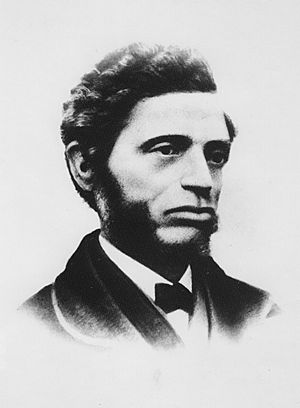William Cooper Nell facts for kids
William Cooper Nell (December 16, 1816 – May 25, 1874) was a prominent African-American abolitionist who fought for equal school rights. Nell challenged race-based discrimination and segregation. He worked as a journalist for abolitionist newspapers The Liberator and The North Star. He also helped found the New England Freedom Association, an all-black organization that helped fugitive slaves in the North. After publishing his work Services of the Colored Patriot, Nell became the first published black historian in the United States.
Contents
Early years
Nell was born in 1816 in Boston, Massachusetts, to Louise Cooper and William Guion Nell. His father was an important figure in the abolitionist movement. Nell had to attend a segregated school for black students, because he was barred from a public school in his neighbourhood.
In 1829, Nell was passed over for an award given to excellent students upon graduation from the Abiel Smith School, apparently because of his ethnicity, and excluded from a celebratory dinner. He managed to attend as a waiter. The school committee instead gave Nell The Life of Ben Franklin, an autobiography.
This experience had a lasting personal impact on him. Nell later promised to do everything in his power to bring forward the day when "the color of the skin will be no barrier to equal school rights."
Abolitionist work
Nell began working against the existing system of segregated schools for black and white children in Massachusetts, gathering 2,000 signatures from the black community on a petition to the state legislature. In 1855 Nell and his colleagues gained a victory; segregation was ended in Boston schools. Nell also encouraged young African Americans to learn outside of the public school system.
He led numerous campaigns to desegregate public facilities in Boston. He succeeded in gaining desegregation of the Boston railroad in 1843, and, in 1853, performance halls in the city.
Later efforts
Nell served as publisher to Frederick Douglass' The North Star, from late 1847 until 1851. He also joined New York anti-slavery societies and founded a literary society. He ended all contact with Douglass in 1853 when the leader advocated the Colored National Council and the Manual Labor School, which represented the types of segregated institutions which Nell detested.
The Fugitive Slave Law of 1850 enforced the recapture of refugee slaves even in free states and increased penalties for those citizens who helped slaves. Nell was inspired to renew his fight against slavery. He created the Committee of Vigilance in Boston, whose members swore to aid escaped slaves. It served a similar purpose to the Freedom Association of 1842, but was illegal under the new federal law. Nell also supported the Underground Railroad.
A few years later, in 1855, Nell achieved another success when the legislature finally abolished segregation in public schools. In recognition of Nell's efforts on this issue, a commemorative dinner was held to honor him. During 1855, Garrison's The Liberator employed Nell to journey around the Midwest and study African-American anti-slavery efforts.
In his time apart from the newspapers, Nell worked for legislation to allow blacks into the Massachusetts militia. He did not succeed in this but lived to see blacks serve in United States armed forces during the Civil War.
Civil War
With the outbreak of the Civil War, Nell worked to have blacks accepted as soldiers in the Union Army.
Personal life
On April 14, 1869, Nell married Frances Ann Ames, the 26-year-old daughter of Philip Osgood Ames, a barber from Nashua, New Hampshire, and his wife Lucy B. (Drake) Ames. The Nells had two sons, William Cooper, Jr. (1870–92) and Frank Ames (1872–81).
Death
Nell died of a stroke in 1874 at the age of 58. His wife survived him by more than twenty years, dying in Nashua, New Hampshire, on September 13, 1895.
Interesting facts about William Cooper Nell
- Nell studied law in the early 1830s. He was never admitted to the bar because he would not swear allegiance to the Constitution of the United States, as he believed it was a pro-slavery document.
- Nell fought for higher education and encouraged the improvement of young African Americans; with John T. Hilton, he founded the Adelphia Union and the Young Men's Literary Society of Boston.
- In 1851, Nell requested money from the state legislature to commission a monument to Crispus Attucks, one of the first martyrs of the American Revolution. When Boston commissioned a major monument to the Boston Massacre to be installed on the Common in 1888, the fallen Attucks was featured in it prominently.
- In 1861, Nell was hired as a postal clerk in Boston, earning the distinction of being the first African American to hold a federal civilian post.
- The William Cooper Nell House, now a private residence in Beacon Hill, was designated a National Historic Landmark in recognition for his contributions to the abolition movement. He lived at that home in the 1860s.


